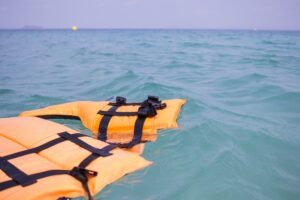
Boating is a popular recreational activity, offering fun and relaxation on the water. However, it also carries significant risks, especially when safety precautions are ignored. The most common causes of boating accidents include operator error, equipment failures, and running aground.
Understanding what leads to these incidents is a critical factor in preventing injuries, property damage, and fatalities. If you’ve been injured in a boat crash caused by someone else’s negligence, you can seek assistance from a Fort Myers boating accident lawyer. You may be able to pursue compensation.
What Causes Boating Accidents?
Boating accidents can occur for a variety of reasons, often stemming from preventable errors or unsafe practices. Factors like distracted driving, poor maintenance, failure to follow boating rules, and even environmental hazards all play a role in many incidents.
Whether navigating calm waters or facing unpredictable conditions, understanding these causes is crucial to reducing risks and staying safe on the water.
Distracted Driving and Lack of Vigilance
Just as with cars, distracted driving is one of the leading causes of accidents on the water. Operators using their phones, chatting with passengers, or focusing on non-essential tasks frequently fail to notice hazards such as other boats, swimmers, or floating debris.
Drinking while boating often leads to inattentive behaviors, which can have dangerous or even deadly results. Boating requires constant vigilance, as conditions can change rapidly. Staying attentive the entire time is crucial for preventing collisions and injuries.
Neglecting Routine Maintenance
Proper upkeep of a vessel is essential for safe boating. Neglecting routine maintenance can lead to mechanical failures, such as a malfunctioning bilge pump or worn-out engine components. These issues can escalate quickly, causing boats to flood, stall, or lose control during operation.
Similarly, failing to check and maintain safety equipment, such as fire extinguishers, can turn minor emergencies into major disasters. A fire onboard without proper extinguishing tools can spread rapidly, endangering everyone onboard. Routine checks and repairs are vital for ensuring that your boat is seaworthy and safe.
Ignoring Boating Rules
Adhering to boating rules is not just about avoiding fines—it is essential for safety. Speeding, failing to yield, or ignoring navigation signals can cause serious boating accidents.
Many boaters also fail to monitor weather conditions, which can lead to dangerous situations if storms or strong winds arise unexpectedly.
Operators of recreational boats and pleasure craft must familiarize themselves with federal and state boating regulations, which are outlined in Florida Statutes Ch. 327 and Ch. 328. Following speed limits, maintaining proper lighting at night, and respecting no-wake zones are just a few ways to avoid collisions and injuries.
Falling Overboard
One of the most dangerous primary accident types is falling overboard. This can occur due to rough waters, sudden movements, or reckless behavior onboard. Without a life jacket, individuals who fall into the water risk drowning, especially if they are not strong swimmers or if the water is cold.
To prevent such incidents, ensure all passengers are briefed on safety protocols and that the boat is not overcrowded. Operators should avoid sharp turns or sudden stops that could throw passengers off balance.
Running Aground
Boat operators who fail to follow navigation charts or ignore water depth markers often find themselves running aground. This occurs when a vessel collides with the seabed, sandbars, or underwater obstacles. The impact can cause significant damage to the boat and, in some cases, result in injuries to passengers.
Avoiding this hazard requires careful planning, particularly in unfamiliar waters. Operators should always consult navigation charts, use depth finders, and proceed cautiously in shallow areas.
Equipment Failures
Equipment failures, often caused by poor maintenance, are another common cause of boating-related incidents. A malfunctioning bilge pump can lead to flooding, while a failing engine can leave the vessel stranded.
Safety equipment, such as life jackets, flares, and fire extinguishers, must also be in good working order to ensure they can be used effectively during emergencies. Performing regular inspections of all equipment and addressing any issues promptly are key steps in avoiding these potentially life-threatening problems.
Common Weather and Environmental Hazards
Environmental factors, such as strong winds, sudden storms, or low visibility, are often overlooked by inexperienced boaters. Unseen dangers, such as submerged debris, rocks, or sandbars, can also cause boat accidents. Operators should always check weather forecasts and waterway conditions before heading out and adjust their plans accordingly.
Operator Inexperience
Many accidents occur because the operator lacks proper training or experience. Operating a boat requires knowledge of navigation, safety protocols, and local boating rules. Inexperienced operators may struggle to handle emergencies or react appropriately to hazards, increasing the likelihood of an accident.
New boaters should consider taking a boater safety course to learn essential skills and ensure they are prepared to operate a vessel safely.



Expect More, Receive More: Legal Support That Feels Like Family
Who Can Be Held Liable for a Boating Accident in Florida?
Determining liability for a boating accident in Florida depends on the specific circumstances of the incident. Operators of vessels are often held responsible if their negligence—such as distracted driving, failure to follow boating rules, or lack of proper maintenance—led to the accident.
However, liability can also extend to boat owners, passengers, rental companies, or manufacturers of defective equipment. For example, a boat owner who neglects routine maintenance or fails to provide proper safety equipment, such as life jackets or fire extinguishers, may be liable.
Similarly, rental companies that inadequately train operators or provide unsafe vessels can also be held accountable. In cases involving equipment failures, the manufacturer of a faulty part or product may share responsibility.
Possible Damages You Can Recover for Your Boating Accident Injuries
Along with severe injuries, boating accidents can bring significant expenses. Depending on the details of your case, you may be able to recover damages for losses such as:
- Medical expenses
- Loss of wages
- Permanent disability
- Pain and suffering
- Loss of guidance
- Physical therapy
Our Florida boating accident attorneys can help you file a claim and identify the damages you are eligible for. Our lawyers work hard to make sure that we find even the hidden damages that negligent parties don’t want you to know about.
If negotiations fall through with the insurance company and a settlement cannot be reached, we can move to a boating accident lawsuit and fight for your rights in court.
What are the Most Common Injuries from Boating Accidents?
Boating collisions can result in minor to severe injuries. Some of the most common injuries from boating accidents are:
- Traumatic brain injuries
- Burns
- Whiplash
- Limb amputations
- Drowning
- Spinal cord injuries
If you don’t see your injury listed above, there’s no need to worry. We cover a wide range of injuries that result from boating accidents. A boating accident injury lawyer can review your injury and tell you if you have a valid case.
Contact Us Today to Learn More About How We Can Help
Boating accidents can happen in an instant, often due to common distractions, unseen dangers, or failure to follow navigation rules. Whether the cause is machinery failure, exceeding legal speed limits, or another cause, the consequences can range from minor property damage to catastrophic harm.
If you or a loved one has been hurt in a recreational boating accident, it’s crucial to understand your legal rights. At Viles & Beckman, we have more than Over 90 years of combined experience, and we’re here to guide you every step of the way.
Don’t wait. Contact us today to discuss your case and learn how we can assist in your recovery.

 Click To Contact
Click To Contact
